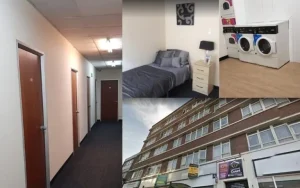Living together with others in the same place can sometimes make it tricky to have our own space. We all need some time alone to feel comfortable and relaxed. So, it’s important to find ways to make sure we can have our privacy, even when we’re sharing our living space. In this blog post, we’ll explore some easy ways to create personal space within shared accommodations. These simple tips can help everyone feel more at ease and respected in our shared home.
1. Establish Personal Zones
To establish personal zones within shared living spaces, it’s essential to carve out designated areas that offer a sense of privacy and retreat. This can be achieved by using room dividers, screens, or curtains to visually separate your space from common areas. By creating a physical boundary, you can create a sense of ownership over your personal area. Additionally, personalizing your zone with comfortable seating, soft lighting, and décor that reflects your personality can further enhance the feeling of having a private sanctuary within the shared environment. These simple adjustments can make a big difference in making you feel more at home and comfortable in your living space.
2. Utilize Noise-Cancelling Headphones
Utilizing noise-cancelling headphones can be a game-changer for maintaining privacy in shared living spaces. By investing in quality headphones designed to block out disturbances, you can create a peaceful environment even amidst noise and commotion. Whether you’re studying, working, or simply trying to relax, these headphones can help you stay focused and undisturbed. Opting for wireless headphones adds an extra layer of convenience, allowing you to move freely around the shared space without being tethered to your device. With noise-cancelling headphones, you can enjoy a sense of privacy and tranquillity wherever you are, enhancing your overall well-being in a shared living environment.
3. Engage in Outdoor Activities
Engaging in outdoor activities can offer a refreshing escape and provide much-needed privacy and solitude in shared living arrangements. Take advantage of nearby outdoor spaces by going for walks, having picnics, or simply spending time in a local park. These activities allow you to immerse yourself in nature, away from the confines of shared living quarters, and can provide a sense of peace and calmness. Whether you’re seeking quiet reflection or simply a change of scenery, spending time outdoors can help you decompress, recharge, and enjoy moments of privacy away from the hustle and bustle of communal living.
4. Maintain Digital Privacy
Maintaining digital privacy is crucial in Shared Accommodations to safeguard personal information and ensure a sense of security. Start by securing personal devices with passwords or biometric authentication to prevent unauthorized access. It’s important to avoid sharing login credentials or leaving devices unlocked, as this can compromise sensitive information. Additionally, take advantage of privacy settings on social media and online accounts to control who can access your personal information. By being proactive about digital privacy, you can protect your data and maintain a sense of privacy even in a shared living environment.
5. Communicate Effectively
In shared accommodations, effective communication is essential for maintaining privacy and fostering a harmonious living environment. It’s important to address privacy concerns directly and respectfully with housemates, ensuring that everyone’s needs and boundaries are understood and respected. By discussing shared responsibilities for maintaining cleanliness and order in communal areas, housemates can collaborate to create a comfortable living space while respecting each other’s privacy. Additionally, using communication tools such as shared calendars or messaging apps can facilitate coordination of schedules and activities, minimizing disruptions and conflicts. Overall, open and transparent communication is key to promoting a culture of mutual respect and cooperation, where privacy is valued and upheld in shared living arrangements.
6. Respect Shared Spaces
Respecting shared spaces is essential for maintaining harmony and privacy in communal living environments. It’s important to clean up after yourself and contribute to household chores to ensure the space remains tidy and comfortable for everyone. Avoiding intrusions on others’ personal space or using their belongings without permission is also crucial for fostering mutual respect and trust among housemates. Establishing clear guidelines for shared spaces helps ensure that everyone’s needs and preferences are taken into account, promoting a supportive and cooperative living environment where privacy is valued and upheld. By respecting shared spaces, housemates can create a positive living experience where everyone feels comfortable and respected.
Read More: Shared Accommodation vs Renting Alone
Conclusion:
Privacy plays a vital role in ensuring comfort and well-being within shared accommodations. By maintaining personal space and boundaries, individuals can feel respected and at ease in their living environment. Clear communication and mutual respect among housemates are essential for fostering a harmonious atmosphere where everyone’s privacy is valued. Implementing the strategies discussed, such as establishing personal zones, utilizing noise-cancelling headphones, and engaging in open dialogue about privacy concerns, can contribute to maintaining privacy and harmony in shared living situations. By prioritizing privacy and cultivating a culture of respect, individuals can create a supportive and enjoyable living experience for everyone involved.





